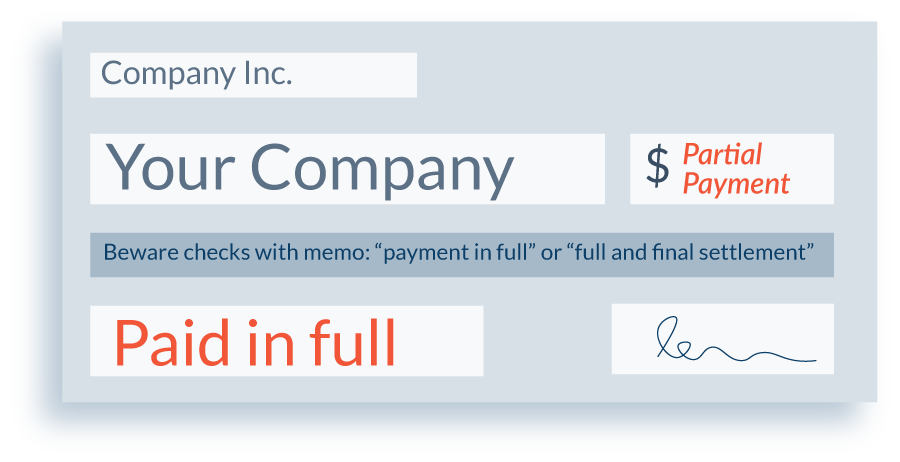
Short Answer: Beware checks with “Payment in Full,” “Full and Final Settlement” or similar language written in the memo line or endorsement area. When these “Payment in Full” checks are cashed, they are very often binding, and can eliminate your rights to recover under contract or the mechanics lien laws.
Long Answer: I was contacted recently with this exact question, and it’s not the first time. I’ve been asked this question by clients more than necessary, as it seems to be a pretty common practice for companies to write checks and designating them as a “final settlement” whenever the parties are in a dispute of any kind.
It’s a great ploy by the paying party. The one who is owed money is obviously very interested in getting paid, and the non-payment to their company may even be causing serious cash flow problems. The paying party throws a check on their desk, and the check – while not a full payment – looks awfully tempting.
As I’ll explain in this post, however, the temptation should be resisted, unless you’re willing to take that single amount as a full settlement of your entire claim.

“Paid in Full” checks are often legally binding
I’ve researched this question quite a while ago for a client in Louisiana who had a $55,000 check on his desk with “full settlement” written on the back. In his mind, the debt was closer to $75,000. He wondered whether cashing the check would prevent him from seeking the remaining $20,000. After conducting my research, I advised that it certainly would.
Courts count “Paid in Full” check deposit as acceptance
This precise scenario came up in the Louisiana case Thompson v. Stacy, 148 So.2d 834 (La. 4th Cir. 1963), and the court reasoned as follows:
Where a dispute exists between parties as to amount due, a mutual settlement and payment of the amount agreed upon is binding on both. Plaintiff contends that an agreement of compromise must be in writing. Under LSA-CC art 3071 and the jurisprudence, an agreement of compromise need not be in writing, unless it deals with an immovable. Here, there was a writing, to-wit, both the checks and the invoice were marked ‘Paid in Full’…The checks were deposited in Plaintiff’s bank account and paid without question. Hence, Defendant’s indebtedness to Plaintiff was fully liquidated.
Louisiana courts didn’t blink on this concept when faced with a more confounding situation twenty years later in Spalitta v. Hartford Fire Ins. Co., 428 So.2d 824 (La. 5th Cir. 1983). In this case, a check was issued marked “Full and Final Settlement” on its face, and was cashed with a restrictive endorsement stating “Receipt acknowledged of amount not in dispute.”
“Full and Final Settlement” in check memo also considered binding
Even though the party depositing the check had indicated his disagreement with the “full and final settlement” offer, the court nevertheless held that the restrictive endorsement was not effective and that the depositing of the check was an acceptance of the final settlement offer. The court reasoned as follows:
[A]ccord and satisfaction is reached when there is a disputed claim, a tender by the debtor for less than the sum claimed, and acceptance of the tender by negotiation of the check…Unilateral action of the creditor in changing the provision denoting full payment does not change the legal import of its acceptance by the payee as an acknowledgment of payment in full…In our case, there is no question that Spalitta knew the draft was offered as full settlement. Therefore, for the reasons stated above, and only for those reasons, we find that plaintiff’s claim for additional payment must fail.
California says contractors can’t have it both ways
This is not a legal concept unique to Louisiana law. In a great article titled “Beware the ‘Payment-In-Full’ Check,” Jeffrey Snyder of Thoits, Love, Hershberger & McLean analyses the situation under California law, and specifically California’s construction of the Uniform Commercial Code (UCC), which is applicable nationwide. Here is his take on the situation:
The Code (Section 3311) describes this procedure as an informal method of dispute resolution carried out by the use of a negotiable instrument, typically a check. Upon receiving the check, the employer was faced with a choice. Either accept the check in full satisfaction of the claim, or return the check and sue for the full balance. But the creditor (the employer in this case) cannot have it both ways; cashing the check in part payment and filing a lawsuit.
Do “Payment in Full” checks affect mechanics lien rights?
This is actually a very interesting question, and I couldn’t find anything directly on point. The thing about mechanics lien rights is that a supplier or contractor has these rights as a matter of law, and by virtue of furnishing materials or labor to a project. By improving a particular project, the law affords these parties a right to encumber the property owner’s property.
The “payment-in-full” check issue only resolves contract claims between the paying party and the receiving party. If the paying party is the property owner (i.e. such as would be the case for a prime contractor), then I think it’s clear that the receiving party would not have a lien right if they agreed to a binding settlement with the payer (as per the above).
So, for example, if a prime contractor claims it is owed $20,000, and the property owner issues a “payment-in-full” check for $15,000 that the GC endorses and deposits, it’s game over. The GC has no contract rights, and loses their lien rights.
Subcontractor payment claims
What if, on the other hand, a subcontractor cashed a “payment-in-full” check from the prime contractor? The subcontractor is prevented from filing suit against the prime contractor for any additional payments, because it is fully settled. But, can the subcontractor file a mechanics lien and seek the remaining portion from the property owner under mechanics lien laws?
It’s an interesting argument, and it may be successful under some very limited circumstances, not to mention favorable statutory language within a particular state’s lien laws. However, in all likelihood, they would be prevented from filing a mechanics lien and stuck only with the amount received from the “payment in full” check.
Avoid bad information on the internet
In addition to doing legal research on this topic, I also did a general Google search on the question. There is a lot of bad information out there.
For example, a Yahoo Answers post ranked very high in my search. Someone asks “Is writing ‘Final Payment’ on a check legally binding?,” and gets a total of 6 answers – all of them very, very wrong. The chosen “Best Answer” states “If such a scheme would actually work then everybody would just try to do this on their first payment. Thanks for the laugh though.”
Every other answer agreed to say the scheme “won’t work” and that “your friend [who suggested the idea] is dreaming.”
I’d like to see how this particular scenario played out for the original person posing the question because he or she got some unfortunate advice here. While there are circumstances when the memo field will not be binding, and each state and circumstance warrants research specific to the same, the binding effect of such a memo is not far-fetched at all, and in a large number of scenarios would create a binding settlement.
Bottom Line: Beware checks with “Payment in Full” in the memo
Ultimately, contractors and suppliers should pay close attention to the memo line when depositing a check from their customer. If the check has “Paid in Full,” “Full and Final Settlement” or similar language written in the memo field or endorsement area, ask for your customer to cut a new one. When these checks are cashed, they are very often binding, and can eliminate your rights to recover missing payment under contract or mechanics lien laws.
Avoid legally binding situations and be aware of the potential circumstances “Payment in Full” checks can have on mechanics lien rights.




